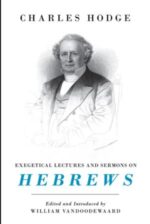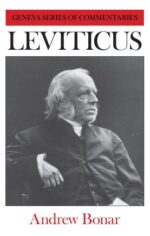Related products
-
Exegetical Lectures and Sermons on Hebrews (Charles Hodge)
$19.75Dr. Charles Hodge (1797-1878) skillfully engages the Greek text in a way that enhances the reader’s understanding of the details and flow of the whole. Those familiar with Hodge’s commentaries on other New Testament epistles will immediately recognize his style and method. Broad themes and fine points merge together in a coherent whole, as the commentator allows the text of Scripture to speak for itself.
$22.00 -
The Priesthood of Christ: Its Necessity and Nature (John Owen)
$16.50Having studied the Epistle to the Hebrews in great depth and written the largest commentary ever composed on Hebrews, John Owen is able to give us a comprehensive guide to the subject of Christ in relation to the priesthood. He explains how the Old Testament themes such as Law and Covenant can relate to Christ’s office of Priest.
$19.99 -
Leviticus (Andrew Bonar)
$28.00Leviticus is one of the least read and understood parts of Scripture. Yet, the author of this commentary points out, no book in the Bible contains more of the very words of God than Leviticus.
Bonar wrote his notes on Leviticus for his personal use, but was persuaded to publish them by friends. His commentary, though based on sound exegesis, is marked by simplicity. The author is always careful to make spiritual application, for, as he says, ‘The Gospel of the grace of God, with all that follows in its train, may be found in Leviticus. This is the glorious attraction of the book to every reader who feels himself a sinner.’




Hebrews (John Brown)
$32.00
Commentaries generally belong to one of two categories. Either they aim at a devotional thoroughness which lays no great emphasis on the exact meaning of individual words, or they concentrate on such a detailed examination of the text that the spirit and power of the book is largely lost. Among the few commentators who stand between these two positions is Dr. John Brown of Edinburgh (1784-1858).
By seeking to develop a style of exposition that was both edifying to his congregation and valuable to his divinity students, he produced commentaries which, in the words of Dr. William Cunningham, ‘formed a marked era in the history of Scriptural Interpretation’. Not behind the foremost contemporary scholars in his emphasis on correct exegesis, he nevertheless sought not only that the minds of his readers might be brought ‘into immediate contact with the mind of the Spirit’ but that their whole being might be resigned to ‘the empire of the Word of God’.
In stock
Hebrews
A Geneva Series Commentary
‘A great expositor, always deep, full and overflowing.” Dr. David Smith says of this work: “There is not a single instance of carelessness in investigating the true meaning of a text, or of timidity in stating the conclusion at which the author had arrived.”
What more could be said in praise of any exposition?’– C. H. Spurgeon
Commentaries generally belong to one of two categories. Either they aim at a devotional thoroughness which lays no great emphasis on the exact meaning of individual words, or they concentrate on such a detailed examination of the text that the spirit and power of the book is largely lost. Among the few commentators who stand between these two positions is Dr. John Brown of Edinburgh (1784-1858).
By seeking to develop a style of exposition that was both edifying to his congregation and valuable to his divinity students, he produced commentaries which, in the words of Dr. William Cunningham, ‘formed a marked era in the history of Scriptural Interpretation’. Not behind the foremost contemporary scholars in his emphasis on correct exegesis, he nevertheless sought not only that the minds of his readers might be brought ‘into immediate contact with the mind of the Spirit’ but that their whole being might be resigned to ‘the empire of the Word of God’.
About the Author
Dr. John Brown (1784-1858), says his biographer Iain Murray, not only employed his entire powers in the study of the Scriptures, but resigned ‘his whole being to the empire of the Word of God.’ Without doubt, it is this spiritual quality of high devotion which has given to his commentaries much of their enduring value.
In 1798, as a young shepherd boy, John Brown requested a Greek New Testament. The bookshop owner said that if Brown could read it, he could have it. Brown read a passage aloud and received the book for free! This shepherd boy went on to become one of Scotland’s greatest preachers
“If I have written anything that will live after me,” Brown declared, “it is because it has been linked on to the everlasting Word of God.” This was a true prophecy. The explanation of the success of his life and the abiding worth of his works is all to be found in the text which he chose for his gravestone, ‘All flesh is grass. The Word of the Lord endureth for ever.’
Other Volumes in the Geneva Series Commentaries:
Cloth over Board
John Brown
740
Banner of Truth
5.75 x 8.8